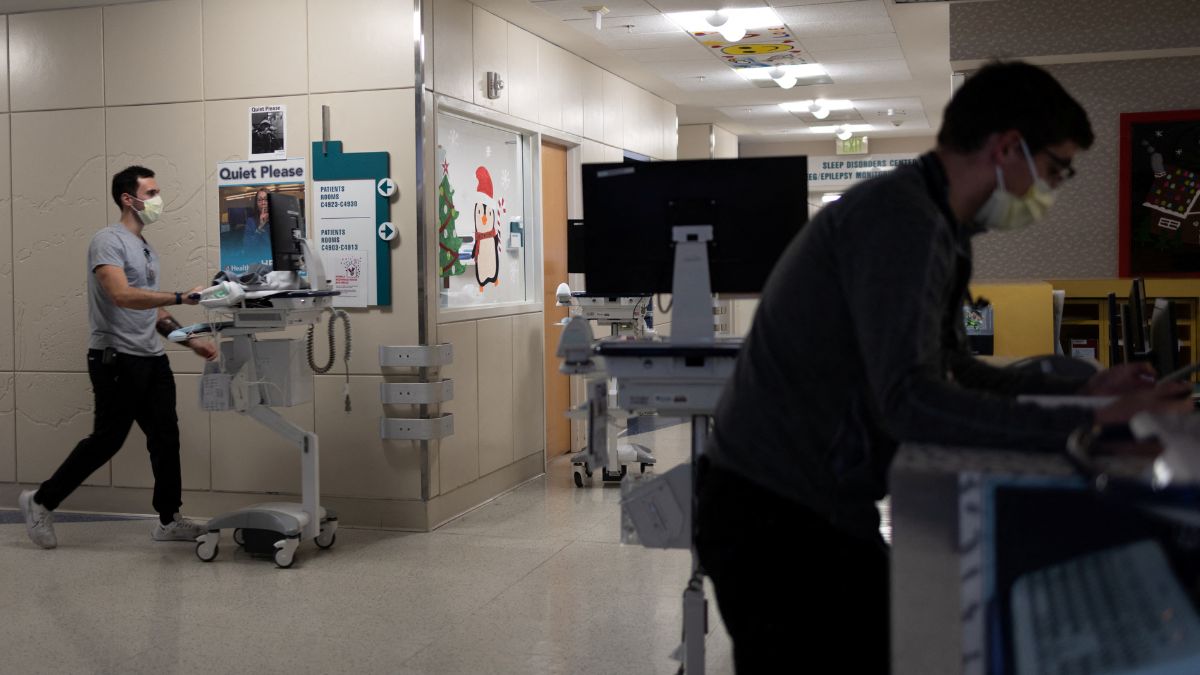The United States’ new $100,000 (Rs 88,09,180) fee for high-skilled H-1B visa workers has stirred panic and chaos. The Donald Trump administration has clarified that the rule will apply to new H-1B petitions and not renewals or current visa holders.
While the tech industry is expected to be the hardest hit by the change, the new $100,000 fee has also raised concerns in the healthcare industry. However, the White House has indicated that Trump’s costly H-1B work visa fees may spare healthcare professionals.
Let’s take a closer look.
Will doctors be exempted?
Doctors could be exempted from the H-1B visa applications, the White House said Monday (September 22).
President Donald Trump signed an executive order on Friday (September 19) to impose a $100,000 application fee for H-1B worker visas.
The executive order released on Friday stated that the new application fees can be waived if the US Secretary of Homeland Security determines that the hiring of the foreign workers is “in the national interest.”
“The restriction…shall not apply to any individual alien, all aliens working for a company, or all aliens working in an industry, if the Secretary of Homeland Security determines…that the hiring of such aliens…is in the national interest and does not pose a threat to the security or welfare of the United States,” the proclamation allowing exemptions under Section 1(c) says.
“The Proclamation allows for potential exemptions, which can include physicians and medical residents,” White House spokesperson Taylor Rogers told Bloomberg News in an email. “Ultimately, the Trump Administration defers to the language in the proclamation.”
Meanwhile, White House press secretary Karoline Leavitt also said that the raised fee will be implemented in the upcoming lottery cycle. Those who already have H-1B visas and are outside the US will not be required to pay the fee for re-entering the country, she said.
Leavitt also clarified that the $100,000 is a one-time payment, not an annual charge. This came after US Commerce Secretary Howard Lutnick said Friday that it is an annual fee.
Why H1-B visas for doctors are crucial for the US
The US is dependent on thousands of medical and paramedical workers who are employed through H-1B visas . One in four doctors in the US is an international medical graduate.
According to a 2024 analysis of data from the Migration Policy Institute (MPI) and the US Bureau of Labour Statistics by Remitly, one in five immigrant doctors in the US is of Indian origin. After the Philippines, India was the second-largest provider of nurses to the US.
As many as 1.76 lakh Indian healthcare workers accounted for seven per cent of the total immigrant healthcare professional population in America.
Indian physicians, physical therapists and medical researchers are now left in the lurch as Trump’s H1-B visa order does not specifically exclude healthcare workers from the steep fees.
Speaking to Mint, Poorvi Chothani, Immigration Attorney and Managing Partner, LawQuest said, “Unlike the pandemic-related travel ban, when the US government had indicated what visas and or travel would be authorised as national interest exceptions, this time there is no such indication.”
“Hence, academics and healthcare professionals, including nurses, occupational and physio therapists, etc., will have to wait for more clarity,” said Chothani. “As of now, their employers will have to pay $100,000 when filing a new H-1B petition as well."
The number of immigrant doctors is higher in low-income, rural parts of the country where American doctors do not want to work, noted The Conversation.
As per the Bloomberg report, the H-1B visa programme is pertinent for hospitals in the US to plug the severe shortage of healthcare workers in some remote parts of the country.
Over 76 million (7.6 crore) Americans reside in places where the government has designated a crunch of primary care doctors, the federal data compiled by health research group KFF found. Most of these areas are rural.
The US government has warned that the country is likely to face a shortage of more than 87,000 primary care physicians by 2037.
Confusion remains
The Trump administration has yet to clarify if doctors and medical residents will be exempted from the higher H-1B visa fees industry-wide or if it will be on a case-by-case basis.
Healthcare employers in the US often sponsor medical residents and other physicians through the H-1B programme.
American Medical Association President Bobby Mukkamala, a Michigan head and neck surgeon, described international medical graduates as “a critical part of our physician workforce”.
“The quantum of H-1B in this (healthcare) category will be less…there will certainly be an impact, but not as much as for tech workers," Bhanu Prakash Kalmath S J, partner and healthcare industry leader at Grant Thornton Bharat, told Mint.
The American Hospital Association, a trade group representing thousands of healthcare facilities, said it was assessing the potential impact of the H-1B visa fee hike.
“We will also work with the administration to stress the importance of including health care personnel in potential exemptions to these changes,” a spokesperson for AHA was quoted as saying by Bloomberg.
Over 4,000 hospitals and research centres sponsored visas as of June. The impact of H1-B visas will be felt if exemptions are not granted.
Biplab Lenin, partner (pharma, healthcare & life sciences) at law firm Cyril Amarchand Mangaldas, told Mint, “If teaching hospitals or mid-sized institutions suddenly have to bear such a steep fee, many may think twice before sponsoring international physicians."
However, immigration attorney Sukanya Raman, country head at Davies and Associates law firm, said to Business Standard that the Trump administration’s proclamation leaves room for flexibility. “Doctors and nurses, and other health care workers, if need arises, may be exempt from the fee,” she said.
Experts have warned that imposing high H1-B visa fees on immigrant healthcare professionals could further burden America’s already strained healthcare system.
With inputs from agencies
)